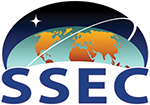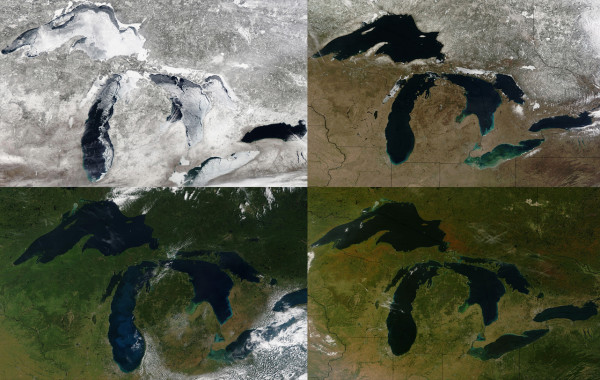Online learning: UW MOOC ‘Changing Weather and Climate in the Great Lakes Region’ launches 2/23
“There’s no place like home. And there’s no place like it.”
Steve Ackerman and Margaret Mooney are not talking about Dorothy’s backyard in Kansas; they’re talking about the Midwest’s backyard: The Great Lakes.
Ackerman, UW-Madison professor of atmospheric and oceanic sciences and Mooney, CIMSS director of education and public outreach, are in complete agreement on that point: There is no other geographic region on Earth that boasts anything quite like the natural beauty of our five, freshwater Great Lakes.
The two have combined their expertise to lead, “Changing Weather and Climate in the Great Lakes Region,” one of six new Massive Open Online Courses (MOOCs) to be offered by the University of Wisconsin-Madison this year.
Ackerman explains, “This is where we live. I don’t think there is enough attention paid to the Great Lakes as an ecosystem. Everyone knows the East and West Coasts, the drought areas of Oklahoma and the Middle Plains, too, but what about the Great Lakes? They are not as well-known but are so important to our regional weather and climate.”
The Great Lakes hold the largest supply of unfrozen freshwater in the world. The National Oceanic and Atmospheric Administration reports that 18% of the world’s total freshwater and 90% of the United States’ total freshwater is stored in the Great Lakes.
The MOOC offers an opportunity for learners to participate in a conversation about this natural resource that provides drinking water to millions of people, along with important economic and ecological benefits.
According to Mooney, the target audience is “people who live in the Great Lakes area and people who live in Wisconsin.” However, people from all over the world and across the United States have already enrolled in the free class.
It’s the Wisconsin Idea in action.
Corresponding to the four seasons (and appropriately, beginning with winter), the four-week course will introduce participants to unique aspects of Great Lakes weather, observed climate changes over the last 50 years, and societal impacts of climate change. The course consists of lectures and activities.
Among the guest presenters are UW-Madison faculty experts:
• Tracey Holloway, Nelson Institute Center for Sustainability and the Global Environment (regional air quality, energy, and climate)
• Chris Kucharik, Nelson Institute Center for Sustainability and the Global Environment (crop production and land management)
• Cathy Middlecamp, Nelson Institute and Chemistry Department (sustainable diets)
• Jonathan Martin, Department of Atmospheric and Oceanic Sciences (synoptic-scale weather systems)
Unique to this MOOC is an opportunity for public libraries around Wisconsin to play a role, bringing an extremely interesting angle to the MOOC for both Ackerman and Mooney.
“We’re eager to talk with local communities about the weather where they live, how climate has been changing, and community response, if any, to those changes,” says Ackerman. As the community crossroads, the library offers a perfect venue for bringing people together, of all viewpoints, for engagement and discussion.
Mooney and Ackerman selected 21 libraries from a pool of 48 applications to host MOOC discussions across the four weeks of the class. “We wanted a variety,” said Mooney. “We’ve got large metro areas represented — like Madison and Milwaukee — along with rural areas. There is a broad cross section of libraries and populations around the state.”
Discussions at libraries are open to the public and will be topically linked to that week’s lecture. Each discussion will be led by a weather expert, she added.
The modules include some ‘edgy topics,’ said Mooney. “One observed change is that we are not replenishing our aquifers — what are some ways we can conserve water? Can we move to a more sustainable diet? We’re hoping that participants, through guided discussion, will want to tackle some of these topics.”
Adds Ackerman, “If the observed changes continue, our forests will shift northward. If you have a student just entering kindergarten, they will witness these changes in their lifetime. It’s real.”
The message from Ackerman and Mooney: Changes in climate are changing the Great Lakes region, which will impact communities, their traditions, and their local economies. And, there are things you can do about it.
The MOOC begins February 23rd and ends March 31st, 2015. To learn more or to register, visit the MOOC’s website: https://www.coursera.org/course/greatlakesclimate
By Jean Phillips

